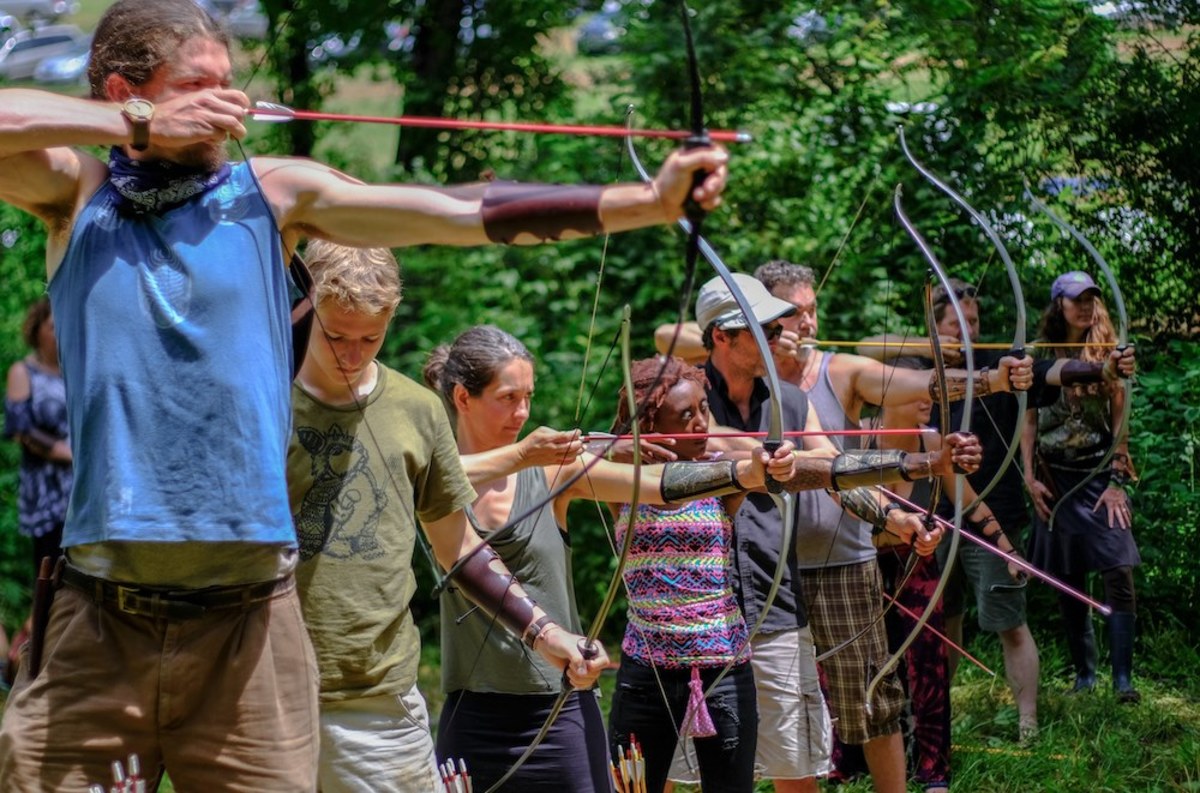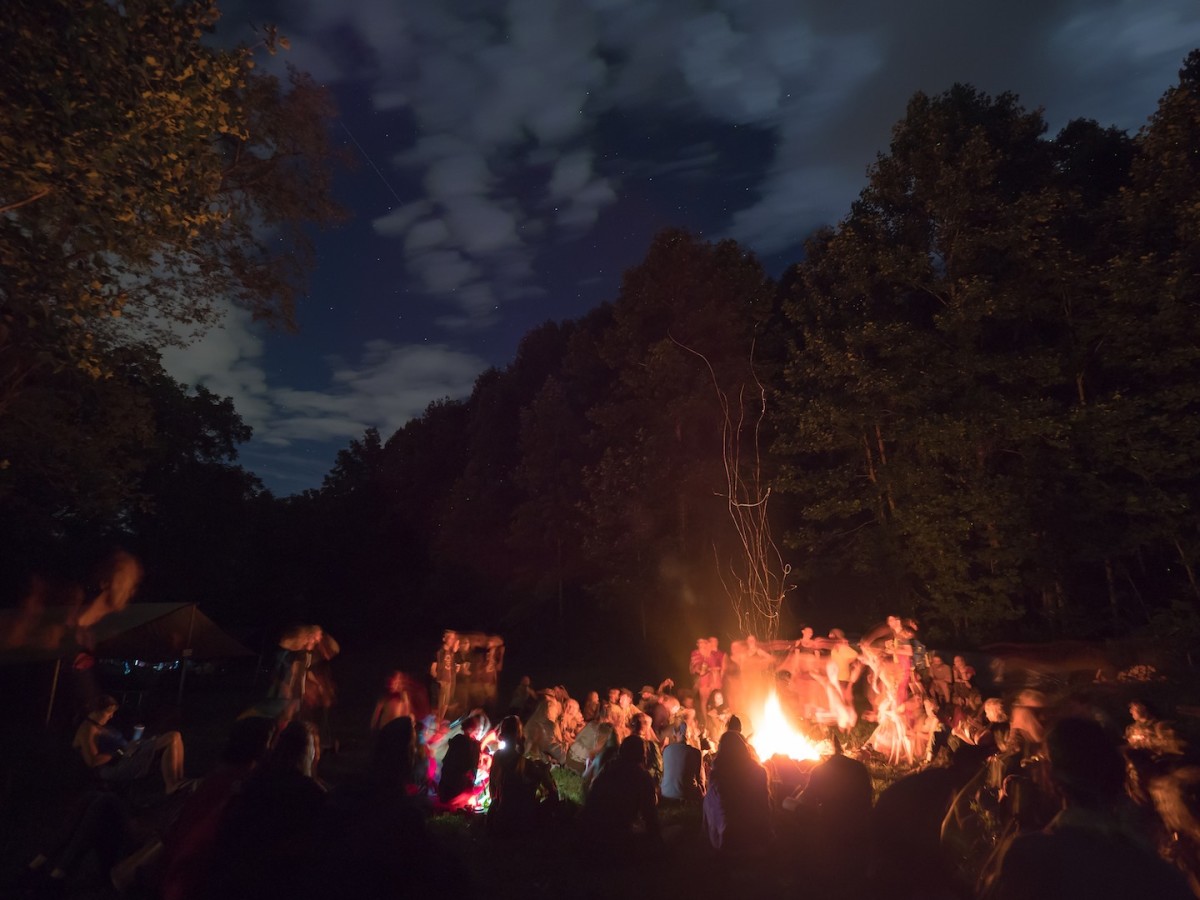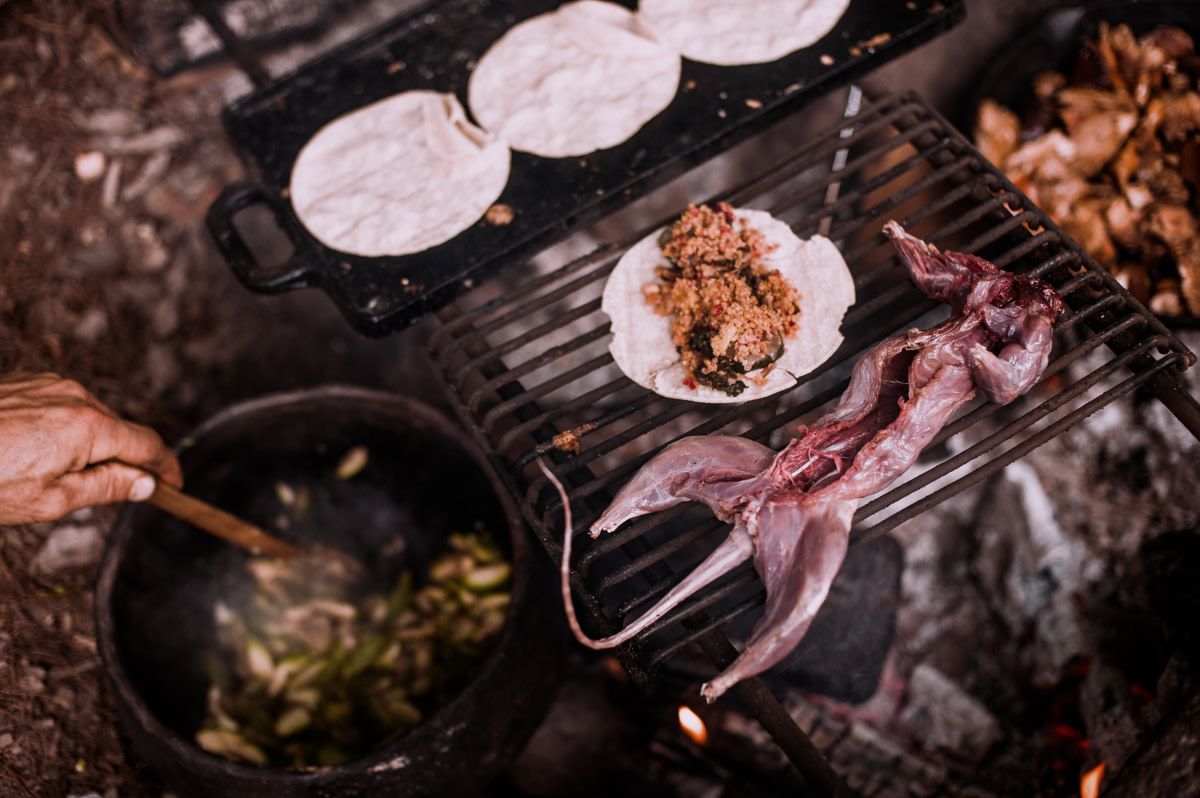Last summer, I decided to learn how to survive. Nothing too serious. Build a fire. Identify poisonous plants. Maybe hunt a small animal. I was never a Boy Scout, but I’ve always had an ambient distrust of the modern world. I figured that having some survival skills might come in handy when things get bad a couple of decades from now. So I drove up from South Florida to a 940-acre farm just outside of Asheville, NC, to attend the Firefly Gathering, the country’s largest primitive technology festival. There, smiling New Age-types promised to teach and celebrate the spiritual and technical skills of our ancestors in order to live in harmony with the Earth. But beneath all their good vibes I could make out an ominous vision of the future.
I didn’t expect them to be so right so soon.
On the campgrounds, I anticipated a lot of woo-woo earnestness. After all, this was a festival without electricity or running water, no internet and no smartphones. The crowd was filled with hippie types, armed with didgeridoos, wide eyes, and unrelenting positivity. But the festival was also attended by Christian homesteaders, blue-collar craftsmen, anarcho-primitivists towing around blonde, androgynous-looking children and yoga pants-wearing graduate students. Polite and cheery, they were like a support group for our dimming world. But they weren’t, in the traditional sense, preppers. The four-day festival was like if Mad Max was set in Canada. They preferred teepees to bomb shelters, hand-carved wooden spoons to assault rifles. “I’m an empath,” a woman named Tara told me my first night, as tears slid down her cheeks. “I can feel the Earth’s pain.” I was quick to dismiss their alarmism. Things are bad, yes, but, at the time, I found their concerns to be exaggerated. Like they were trying to justify their quirky hobbies with a fantastical future.

When Firefly launched in 2007, 200 folks showed up. But in recent years, it has drawn more than a thousand people. Growing distress about the climate helps to explain the spike, said Marissa Percoco, Firefly’s executive director. “A portion of the people are motivated by fear,” she said. “They don’t see modern society as a viable option.” She first attended Firefly in 2010, when she was living off the grid, with her four children, near Chattanooga, TN. “I taught a fermentation class,” she said, “and right away felt like I wasn’t alone.”
In 2019, Percoco’s team capped the number of attendees at 800, for a more intimate learning experience. The classes covered practical survival subjects, such as scythe techniques and how to butcher rabbits and make tools out of deer bone. Others were a bit more whimsical: herbal birth control, conversing with land spirits, plastic remediation meditation.
I couldn’t resist some of the more peculiar classes. Symbiosis and the Ecology of Paradise was taught by a biologist named Lee Golos. Golos, who wore a bohemian poncho and was a dead ringer for pre-Islam Cat Stevens, explained that 150,000 years ago, humans and animals, including apex predators, lived in a paradise, thanks to an abundance of berries. We can return to this life, he said, if we embrace anarchism and permaculture. A woman asked whether, in this berry-eating utopia, friendly grizzly bears can nanny her children. Golos nodded, as if to say, “Of course.”
I took another class with an herbalist who called himself the Bush Ninja (his real name was Alex Howe). He led a class on ancient health remedies. For the class, he spread out an assortment of herbal medicines he procured while living in South Africa. They were all bitter and promised all kinds of cures. The Bush Ninja told us we need more bitter things in our lives. We’ve saturated our diets with too much sweetness. One of the medicines was derived from the petrified piss of a gopher. It wasn’t so bad.

The most intense class of the festival had me stuffed inside a tiny sweat lodge with 25 other semi-naked men and women. We huddled in darkness around a pit that held a dozen glowing, fire-soaked stones, our sweaty limbs rubbing up against each other. This class was supposed to get us in touch with our ancestors through suffering, but I could only think about how much oxygen we had left to breathe. The sweat lodge leader, Uncle Skee Strong Wind Pratt of the Pima tribe of Arizona, poured bowl after bowl of water over the rocks and hot vapor burned our lungs. I knew it was dangerous, but I felt I had to trust Uncle Skee. After 20 minutes, Uncle Skee opened the canvas flap, letting cool air, light, and relief flood into the hut. He invited us to pray or sing aloud. People said things about feeling the embrace of Mother Nature’s womb and sang about the love and presence of our ancestors. After about two hours we exited the hut. Everyone was covered in sweat-caked mud and we lined up to stare in each other’s eyes and then make a long embrace before we washed off in a cold stream nearby. What I wouldn’t give now for the ability to hug a bunch of corny, sweaty strangers.
What I wouldn’t give now for the ability to hug a bunch of corny, sweaty strangers.
I made sure to learn at least one practical skill. I attended a class on how to make a fire with a bow drill, an ancient technological upgrade from rubbing two sticks together. I failed again and again to get a blaze going. The spindle slipped out of the bow, or the embers died, or I burned my hand against the friction-hot wood. But the instructor, a large, shirtless boy just barely out of his teens, was patient. After an hour of rubbing, the coal turned red. I carefully packed it into some tinder and softly blew air into the smoldering matter I held in my hands. Smoke spiraled from the embers and a fire emerged. I held the flame in front of me like an offering and the young instructor let out a primal whoop. “You did it!” He shouted. It was the first thing I’ve ever made using only the Earth. I’ve hated everything I’ve ever written, but I was proud of that little fire.

A woodworker named Marc Kessler led a class on how to make hand-hewn wood beams. I missed his class because I was too busy sampling rodent pee, but had a chance to chat with him over a fire. He sported a buckskin jacket he made himself. He told me I could live on $4,400 a year. “We pray for the apocalypse every day,” he told me. “Something has got to change. We’re screwing it all up.”
When I left Firefly, my skepticism was still intact. I doubted the practicality or need of many of these skills in some imagined end-of-world scenario. Now, however, the virus has changed all that. These people were ahead of the curve. This virus is a soft apocalypse. A dress rehearsal for what’s to come. And these festival-goers have not just the technical knowledge needed to survive, but something even more important—hope for a kind future.
This year’s Firefly Gathering has been cancelled, and it’s a shame because I would most certainly attend. I remember there being a class that taught which plants are safe to use in place of toilet paper.
from Men's Journal https://ift.tt/2DcnE9P
via IFTTT








0 comments:
Post a Comment